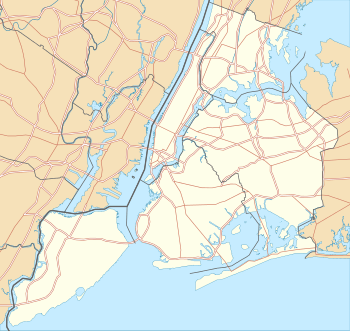Society for the Lying-In Hospital
|
Society for the Lying-In Hospital | |
|
The building with a detail of a swaddled baby from the facade (2010) | |
   | |
| Location |
305 2nd Avenue Manhattan, New York City |
|---|---|
| Coordinates | 40°44′5″N 73°59′1″W / 40.73472°N 73.98361°WCoordinates: 40°44′5″N 73°59′1″W / 40.73472°N 73.98361°W |
| Built | 1902[1] |
| Architect | R. H. Robertson |
| Architectural style | Renaissance Revival[1] |
| NRHP Reference # | 83001746[2] |
| Added to NRHP | September 1, 1983 |
The Society for the Lying-In Hospital, now known as Rutherford Place, at 305 Second Avenue between East 17th and 18th Streets in the Stuyvesant Square neighborhood of Manhattan, New York City, was a maternity hospital built in 1902 and designed by noted architect R. H. Robertson in the Renaissance Revival style, with a Palladian crown at the top. Swaddled babies decorate the spandrels of the building, which was converted to offices and apartments in 1985 by Beyer Blinder Belle.[1]
As the years passed, John Pierpont Morgan, Jr. was concerned about the long-term stability of the hospital his father had so generously provided for. He recruited John D. Rockefeller, Jr.; George F. Baker, Sr.; and George F. Baker, Jr. to join forces in establishing an association with New York Hospital. Upon the subsequent opening of the New York Hospital-Cornell Medical Center in 1932, the Lying-In Hospital moved out of the Second Avenue building. It became the more modern-sounding Obstetrics and Gynecology Department of New York Hospital,[3] which is still part of NewYork–Presbyterian Hospital
The building was added to the National Register of Historic Places in 1983.
See also
References
Notes
- 1 2 3 White, Norval & Willensky, Elliot (2000), AIA Guide to New York City (4th ed.), New York: Three Rivers Press, ISBN 978-0-8129-3107-5, p.210
- ↑ National Park Service (2009-03-13). "National Register Information System". National Register of Historic Places. National Park Service.
- ↑ http://weill.cornell.edu/archives/history/lying_in_hospital.html?
External links
 Media related to Society for the Lying-In Hospital at Wikimedia Commons
Media related to Society for the Lying-In Hospital at Wikimedia Commons


